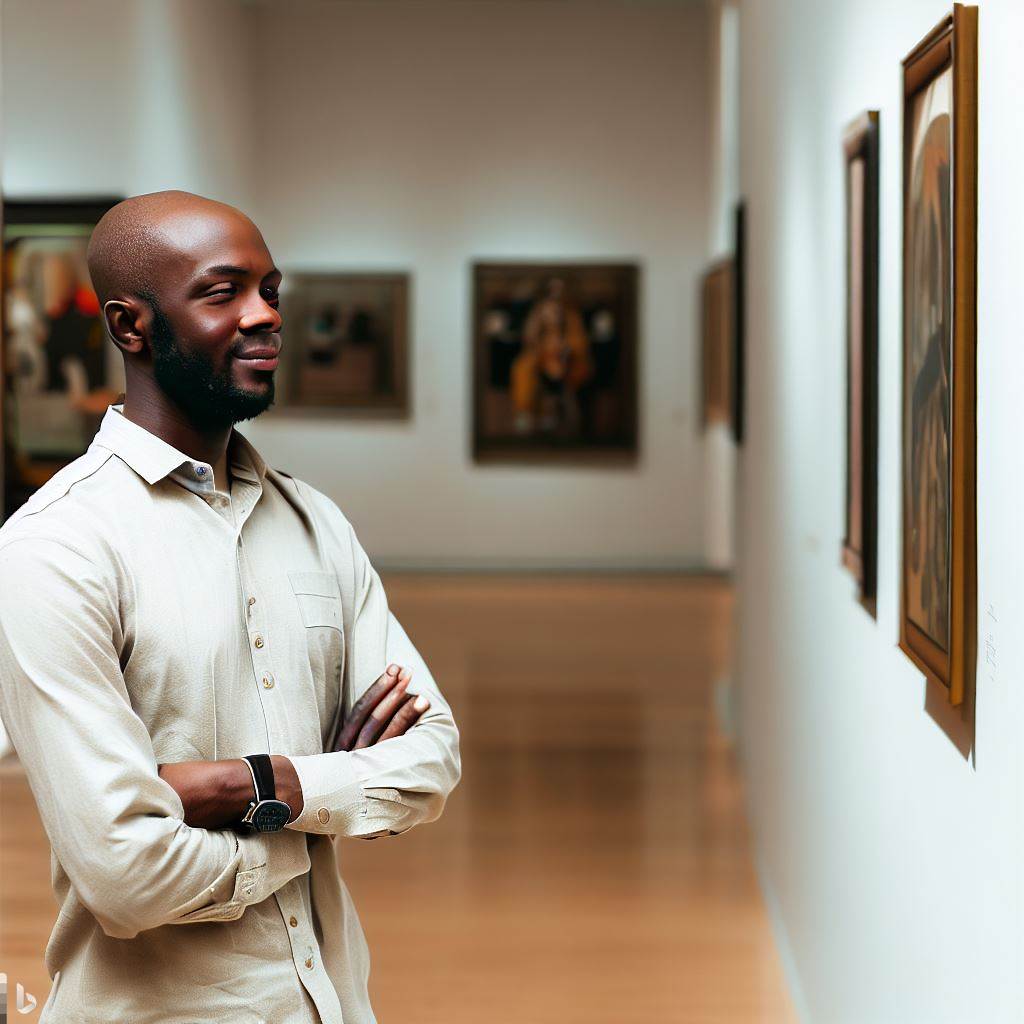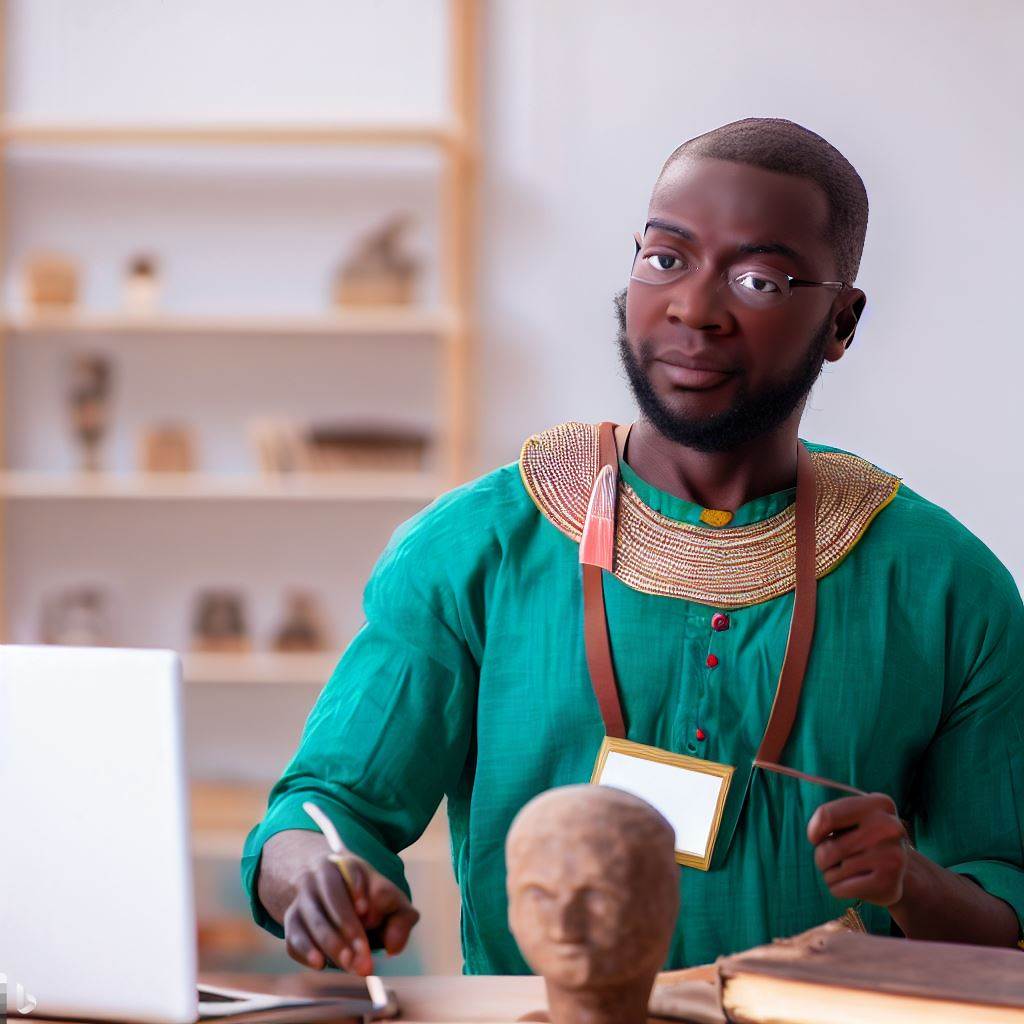Introduction
Museum ethics for curators is a critical topic that holds significant importance in the field.
It encompasses a set of guidelines and principles that curators must adhere to when managing and presenting collections in a museum.
These ethics serve as a moral compass, ensuring that the cultural heritage is preserved, respected, and shared with the public in an appropriate manner.
From a Nigerian perspective, the concept of museum ethics takes into account the unique cultural context and heritage of the country.
Nigeria, with its diverse ethnic groups, rich history, and distinct artistic traditions, presents specific challenges and opportunities for curators.
The Nigerian perspective emphasizes the need for a sensitive and culturally informed approach in curating collections, taking into account the country’s complex heritage.
Furthermore, the relevance of the Nigerian perspective extends beyond national boundaries.
In an increasingly globalized world, museums are becoming more interconnected, and curators must cultivate an understanding and respect for various cultural perspectives.
The Nigerian perspective offers a valuable lens through which curators can evaluate their own practices and engage with diverse perspectives.
In this blog section, we will explore the topic of museum ethics for curators from a Nigerian perspective.
By understanding the context and relevance of the Nigerian perspective, we can gain insights into the broader challenges and considerations faced by curators worldwide.
This exploration aims to encourage a more inclusive, culturally sensitive approach to curatorial practices and foster an appreciation for the diverse heritage of the museum sector.
Understanding Museum Ethics
Museum ethics plays a vital role in guiding curators’ decision-making process and ensuring they fulfill their responsibilities effectively.
By adhering to ethical guidelines, curators contribute to the preservation and promotion of cultural heritage within a Nigerian context.
Museum ethics and its importance for curators
It is crucial for curators to define and understand museum ethics.
Museum ethics encompass a range of principles and guidelines that govern curators’ professional practices.
These principles ensure that curators uphold the highest standards of integrity, professionalism, and accountability in their work. The importance of museum ethics for curators cannot be overstated.
Ethical conduct not only preserves the trust and credibility of museums but also strengthens the relationship with the public and relevant stakeholders.
By prioritizing ethical considerations, curators cultivate a sense of transparency and accountability within the museum’s operations.
The ethical challenges faced by curators worldwide
Curators worldwide face numerous ethical challenges in the dynamic landscape of museum management.
One of the key challenges is striking a balance between public access and artifact preservation.
Curators must navigate the demands of exhibition and education while ensuring the long-term sustainability of the museum’s collection.
Additionally, curators must respect copyright laws and intellectual property rights when acquiring and exhibiting artworks.
The issue of repatriation also presents ethical dilemmas, with curators grappling with questions of ownership, cultural heritage, and historical injustices.
They must navigate these complexities while fostering dialogue and understanding between cultures.
Specific ethical concerns relevant to the Nigerian context
In the Nigerian context, specific ethical concerns arise due to its diverse cultural heritage and history.
The repatriation of Nigerian artifacts looted during colonial periods is a significant concern for curators.
These artifacts hold immense cultural and historical value, and their return is crucial for the preservation of Nigeria’s heritage.
Ethical considerations also arise when displaying cultural artifacts without proper consent or consultation with indigenous communities.
Curators must work closely with local communities to ensure that their cultural heritage is represented accurately and respectfully.
This collaboration fosters a sense of ownership, inclusivity, and mutual respect within the museum space.
Furthermore, curators must navigate the delicate balance between showcasing Nigerian cultural heritage and respecting religious beliefs.
Careful consideration must be given to the display of sacred objects and practices to avoid any offense or disrespect.
Preservation practices play a crucial role in safeguarding Nigerian artifacts.
Curators must implement adequate security measures to protect against theft and ensure proper environmental controls to prevent degradation and climate-related damage.
Basically, understanding museum ethics is paramount for curators in their professional journey.
It enables them to navigate complex ethical challenges, preserve cultural heritage, and foster meaningful connections with communities.
The Nigerian context brings unique ethical concerns, necessitating a thoughtful and inclusive approach to museum management.
Curators have a responsibility to uphold ethical principles, ensuring the preservation and promotion of Nigerian cultural heritage for future generations.
Read: The Evolution of Curatorial Practices in Nigeria
Cultural Sensitivity and Repatriation
Significance of cultural sensitivity in curatorial work
- Cultural sensitivity is crucial in curatorial work as it ensures respect for diverse cultural perspectives.
- Curators must understand the unique values, beliefs, and practices of the communities they work with.
- By being culturally sensitive, curators can appropriately represent and interpret art within its cultural context.
- It helps to avoid misrepresentations, stereotypes, and cultural appropriation, fostering mutual understanding and respect.
- Curators need to collaborate with community members to gain insight into their cultural heritage and traditions.
- Respecting cultural sensitivity fosters trust, strengthens relationships, and enhances the authenticity of exhibitions.
- Visitors can engage with the curator’s interpretations, leading to a more meaningful and enriching museum experience.
- By practicing cultural sensitivity, curators can contribute to creating a more inclusive and diverse museum environment.
The ethical considerations surrounding the repatriation of Nigerian artifacts
- The repatriation of Nigerian artifacts raises ethical questions regarding ownership, preservation, and cultural identity.
- Artifacts taken during colonial times without consent often belong to the cultural heritage of Nigeria.
- The ethics of repatriation consider the rights of source communities to reclaim and protect their cultural treasures.
- Returning artifacts provides an opportunity for healing historical wounds and acknowledging past injustices.
- Repatriation challenges the Eurocentric museum narratives by allowing the voices of the source communities to be heard.
- However, repatriation may also pose challenges in terms of preserving and safeguarding the artifacts in Nigeria.
- Collaborative agreements between museums and source communities should be established to ensure proper care and preservation.
- Repatriation should involve sharing knowledge, expertise, and resources for the benefit of both parties involved.
The impact of repatriation on the preservation and promotion of Nigerian cultural heritage
- Repatriation contributes to the preservation of Nigerian cultural heritage by reuniting artifacts with their original context.
- It allows for the revival of traditional practices and rituals associated with the artifacts.
- Repatriation strengthens the sense of cultural identity and pride among Nigerians, fostering cultural preservation efforts.
- It encourages cultural tourism and boosts the local economy, creating opportunities for education and sustainable development.
- The return of artifacts can inspire new generations to connect with their cultural heritage and traditional knowledge.
- Repatriation challenges the dominant Western narrative, promoting a more balanced and inclusive representation of Nigerian culture.
- Preserving and promoting Nigerian cultural heritage requires a collaborative effort between museums, communities, and governments.
- Repatriation should serve as a catalyst for dialogue, education, and the celebration of Nigeria’s rich cultural diversity.
Read: How to Get Your First Curator Job in Nigeria
Collaboration and Community Engagement
The importance of collaboration between curators and Nigerian communities
Collaboration between curators and Nigerian communities is vital for the success of museums in Nigeria.
It ensures that the perspectives, histories, and cultural experiences of the community are accurately represented and preserved.
Curators cannot function in isolation; they need the invaluable knowledge, insights, and contributions of the local communities they serve.
By collaborating with community members, curators gain a deeper understanding of the context, meaning, and significance of the artifacts they collect and display.
Active engagement with Nigerian communities fosters a sense of ownership and pride among community members.
It creates a platform for dialogue and allows museums to be spaces of cultural exchange and collective memory.
Furthermore, collaboration enhances the credibility and authenticity of museum exhibitions and programs.
When curators consult with community members, the narratives presented become more accurate, nuanced, and respectful of diverse perspectives.
The ethical implications of community engagement in the museum sector
Community engagement in the museum sector raises ethical considerations that curators must conscientiously address.
One of the key concerns is the potential for exploitation or appropriation of the community’s cultural heritage.
Curators must ensure that their collaborations with communities are based on principles of equity, reciprocity, and informed consent.
They should actively involve community members in decision-making processes, making sure that their voices are valued and their rights protected.
Another ethical consideration is the responsibility to represent communities authentically and accurately. Curators should avoid creating harmful stereotypes or misrepresenting cultural practices and beliefs.
Furthermore, curators must consider issues of cultural sensitivity and intellectual property rights.
They should take appropriate measures to safeguard and respect community knowledge, intellectual traditions, and traditional practices.
Successful examples of curators upholding ethical standards through community involvement
Several curators in Nigeria have set commendable examples by upholding ethical standards through community involvement.
For instance, the National Museum of Nigeria in Lagos has collaborated with the Benin community to create an exhibition on the Benin Kingdom’s rich artistic legacy.
The curators worked closely with the community’s traditional authorities, artists, and scholars to ensure the accurate portrayal of their cultural heritage.
In another example, the Jos Museum in Plateau State established a community outreach program that involves local schools and cultural organizations.
Through workshops, exhibitions, and educational activities, the museum actively engages with the community, promoting cultural appreciation and understanding.
These successful collaborations demonstrate the positive impact of community engagement on museums.
They lead to the creation of inclusive and diverse narratives and foster mutual respect and understanding between curators and Nigerian communities.
Generally, collaboration and community engagement are essential for curators in Nigeria.
It allows for the accurate representation of community perspectives, fosters cultural exchange, and upholds ethical standards.
Curators must approach community engagement with sensitivity, respect, and a commitment to equitable partnerships.
Read: Freelance Curating in Nigeria: Tips and Insights

Curation and Interpretation of Sensitive Topics
Ethical challenges of curating sensitive topics in Nigerian museums
- Curating sensitive topics in Nigerian museums poses significant ethical challenges.
- The curator must navigate the balance between preserving history and respecting cultural sensitivities.
- Ensuring the accuracy and authenticity of the curated materials is crucial.
- Sensitive topics may include cultural conflicts, human rights abuses, or politically controversial events.
- The curator must consider the potential impact on the audience and community.
- Curating such topics requires extensive research and consultation with experts and community members.
- It is necessary to approach sensitive topics in a respectful and sensitive manner.
- The curator must be aware of cultural biases and avoid presenting any narrative that perpetuates stereotypes.
- Transparency and accountability are vital in curating sensitive topics.
- The museum should provide explanations for the curator’s decisions in selecting and presenting these topics.
The responsibility of curators in capturing diverse narratives and perspectives
- Curators have a responsibility to capture diverse narratives and perspectives in museum exhibitions.
- Representation of various voices and experiences allows for a more inclusive and comprehensive understanding of history.
- Curators must actively seek out marginalized and underrepresented communities to narrate their own stories.
- Challenges may arise in gaining access to narratives that have been suppressed or overlooked.
- The curator should collaborate with community members to provide an accurate representation of their perspective.
- Inclusive curation helps to break the dominance of a single narrative and fosters a more respectful discourse.
- Curators should empower communities to tell their stories through oral histories, artwork, and personal testimonies.
- Constant evaluation and reflection on one’s own biases are essential for capturing diverse narratives.
- Curators can engage in partnerships and interdisciplinary collaborations to broaden their knowledge and perspectives.
- The goal is to create a space where all visitors can connect with and learn from different narratives.
Potential controversies and ethical dilemmas related to the interpretation of sensitive topics
- Interpretation of sensitive topics may lead to controversies and ethical dilemmas.
- The curator must navigate the complexities of multiple perspectives and potential conflicts of interest.
- Striking a balance between representing differing viewpoints and maintaining historical accuracy is challenging.
- Controversies may arise if certain narratives are excluded or if a dominant narrative is challenged.
- Curators must be prepared to handle criticism and engage in constructive dialogue with stakeholders.
- Ethical dilemmas may emerge when curating topics that involve cultural appropriation or painful histories.
- Consultation and collaboration with affected communities can help navigate these ethical challenges.
- The curator should consider including diverse interpretations and acknowledging differing narratives.
- Openness to feedback, dialogue, and change is crucial in addressing potential controversies.
- Transparency about the curatorial process can contribute to building trust with the audience and community.
Read: The Influence of International Curators in Nigeria
Transparency and Accountability
Advocate for transparency and accountability in museum operations
- Museums serve as guardians of cultural heritage, making transparency and accountability vital.
- Curators must advocate for open communication and disclosure of museum operations to build public trust.
- Transparency helps in showcasing the museum’s commitment to preserving historical artifacts and promoting cultural understanding.
- Curators should be proactive in sharing information about acquisitions, funding sources, and decision-making processes.
Ethical responsibility of curators to ensure public trust
- Curators, as custodians of heritage, bear the ethical responsibility to maintain public trust in museums.
- They should strive to create an environment where the public feels confident in the integrity of museum operations.
- An ethical curator ensures the transparency of collections, exhibitions, and research activities.
- Openness and honesty are crucial pillars in preserving public trust and credibility of museums.
Mechanisms for implementing transparency and accountability measures in Nigerian museums
- Develop clear museum policies and procedures that emphasize transparency and accountability.
- Create dedicated committees or oversight bodies to monitor and ensure adherence to ethical standards.
- Regularly publish annual reports detailing the museum’s activities, finances, and decision-making processes.
- Establish mechanisms for public input, such as surveys or public forums, to engage the community in museum affairs.
- Encourage collaborations with other museums, professionals, and stakeholders to foster transparency and knowledge sharing.
- Implement clear documentation processes for acquisitions, including provenance research and ethical sourcing.
- Develop accessible and user-friendly platforms for the public to access information about the museum’s collections and operations.
- Provide training and professional development programs for curators on ethics, transparency, and accountability.
- Regularly review and update policies to adapt to changing ethical standards and societal expectations.
- Engage in open dialogue with the public, addressing concerns, and actively seeking feedback.
Transparency and accountability are essential aspects of museum ethics, requiring curators to advocate for openness, honesty, and public trust.
By implementing mechanisms that ensure transparency and accountability, Nigerian museums can strengthen their integrity and credibility, fostering a deeper connection with the public and preserving cultural heritage for future generations.
See Related Content: Recent Advances in Holography: Nigeria’s Role & Contribution
Conclusion
In this blog post, we have discussed the importance of museum ethics for curators in Nigeria.
Ethical considerations are crucial for curators as they preserve and present cultural heritage.
As curators in the Nigerian context, it is essential for us to prioritize museum ethics.
By adhering to ethical standards, curators can ensure the preservation and interpretation of Nigeria’s rich cultural heritage.
We must engage in continuous education and dialogue to enhance our ethical understanding as curators.
Curators should strive for transparency, inclusion, and professional integrity in their work.
The adoption of ethical principles will enhance the reputation and credibility of museums in Nigeria.
To achieve this, curators must establish clear policies and guidelines that address ethical concerns.
Collaboration with stakeholders, such as local communities and artists, is crucial in ethical decision-making.
In a nutshell, curators have a responsibility to prioritize museum ethics in the Nigerian context.
By doing so, we can contribute to the preservation and promotion of Nigeria’s diverse cultural heritage.
Let us take action now and ensure that ethical considerations remain at the forefront of our curatorial practices.




